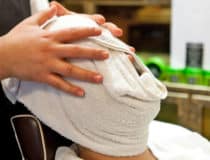British Army Beards: Embracing Facial Hair After a Century-Long Ban
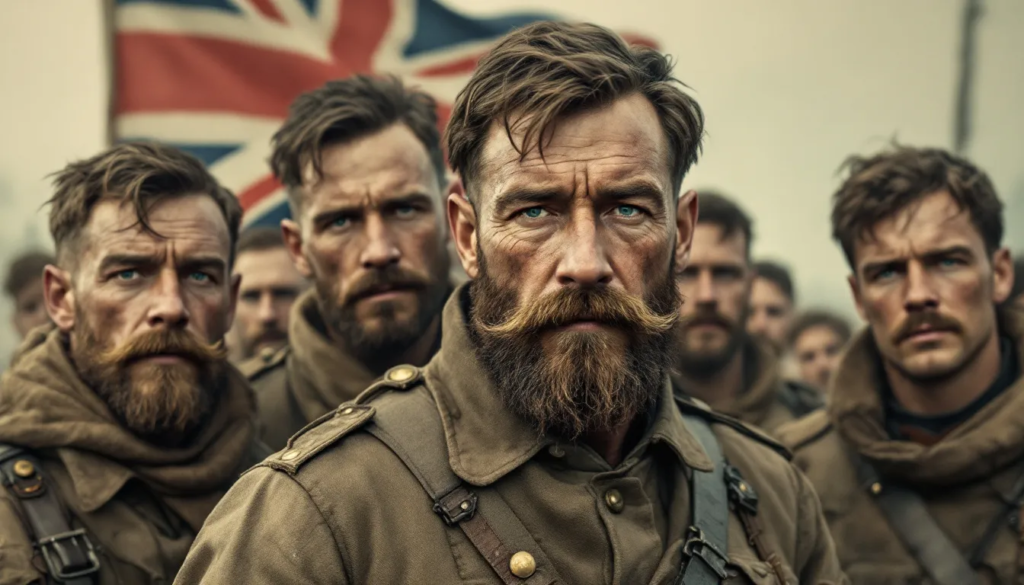
Can British soldiers have beards now? Yes, as of March 2024, the British Army permits beards after lifting a century-old ban on British Army beards. This move aligns with modern societal trends and aims to enhance recruitment and morale. We’ll explore the history of this ban, the changes in grooming standards, and the new policy’s impact on the Army.
Key Takeaways
The British Army has lifted its century-long ban on beards, effective from March 2024, reflecting a move towards modernizing personal grooming standards.
Strict grooming regulations have been established to ensure beards are kept professional, with specific guidelines on length and maintenance to uphold the Army’s disciplined image.
The policy change is anticipated to enhance recruitment and morale by making the Army more appealing to a younger demographic that values personal expression.
The Historic Ban Lifted
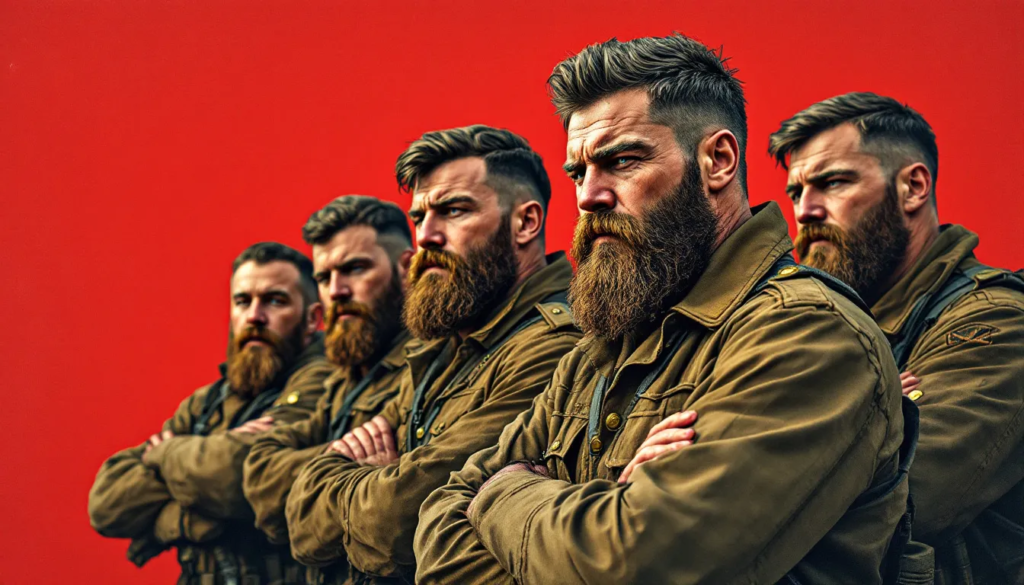
In a historic move, the British Army has lifted its longstanding ban on beards. This decision, effective from March 2024, marks the end of a century-old tradition that required soldiers to remain clean-shaven. King Charles’ approval of this change came after extensive consultations with military and political leaders, reflecting a significant shift in the Army’s approach to personal grooming. The change aligns the Army with modern societal norms, where facial hair is increasingly accepted and even celebrated.
The lifting of the beard ban was not a decision made lightly. It signifies a broader effort to modernize the British Army’s image and make it more appealing to new recruits. With facial hair becoming more common among young men, this policy change is a step towards aligning military standards with contemporary trends.
The subsections that follow will delve deeper into the royal approval that facilitated this change and the reactions from soldiers and officers within the ranks. These perspectives will provide a comprehensive view of the implications and reception of this new policy.
The Royal Approval
King Charles’ approval of the new beard policy marks a significant departure from a century-long military tradition. King Charles has shown his commitment to modernizing the British Army and aligning it with contemporary societal standards by lifting the ban on full beards. This decision also reflects a broader trend within the armed forces to embrace change and adapt to the evolving preferences of the British public.
King Charles’ endorsement followed extensive consultations with military leaders and political advisors, ensuring the decision was well-informed and considerate of the Army’s operational needs. This approval underscores how army leadership drives significant policy changes and sets the tone for the future of the British Army.
Reactions from the Ranks
The new beard policy has elicited mixed reactions from soldiers and officers. Many welcomed the change as a step towards modernity and personal expression, while others worried about a potential decline in disciplined appearance. Some personnel described the permitted beards as ‘scruffy looking,’ raising questions about maintaining a smart turnout.
The varying opinions highlight the challenges of implementing such a significant change. While the policy aims to align with modern trends and boost morale, it must also ensure that the disciplined and professional image of the British Army is upheld.
New grooming standards have been established to address these concerns and ensure that beards are maintained to high standards.
New Grooming Standards for Beards
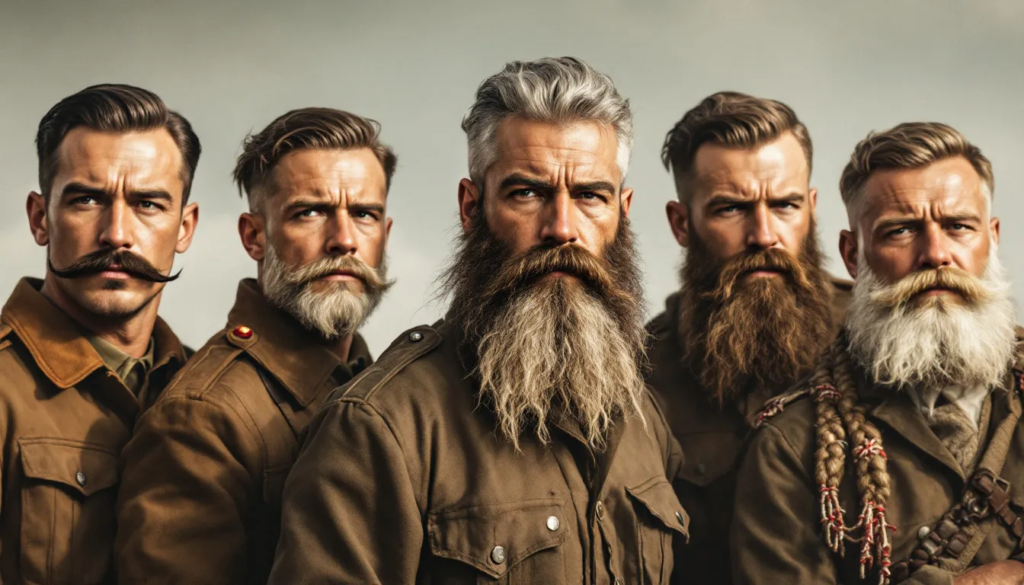
With the new policy allowing beards, the British Army has established strict grooming standards to ensure that facial hair is kept neat and professional. These regulations balance personal expression with the disciplined image of the armed forces. Soldiers are permitted to grow beards, but they must adhere to specific guidelines regarding length and grooming.
The new grooming standards specify that beards must be trimmed and maintained between Grade 1 (2.5mm) and Grade 8 (25.5mm or one inch). Additionally, beards must be kept off the cheekbones and neck, with no patchy growth allowed.
Details on the permitted beard styles and grooming requirements for allowed beards follow.
Permitted Beard Styles
The British Army’s new policy allows only full beards, which must be well-groomed and tidy. Soldiers are required to keep their facial hair neat, with regular inspections to ensure compliance with the grooming standards. This ensures that soldiers can express themselves through their beards while maintaining a professional appearance.
The policy explicitly permits only full beards and only facial hair, with no allowance for partial or patchy or uneven growth. This ensures uniformity across the ranks and addresses concerns about an unkempt appearance. The focus on regular grooming and inspections reflects the Army’s commitment to maintaining high appearance standards.
Grooming Requirements
The British Army’s new grooming policy includes detailed requirements to ensure beards are properly maintained and do not detract from the disciplined image of the forces. Beards must be trimmed above the cheekbones and neck, and must not exceed a length of 25.5mm. This ensures that facial hair remains neat and professional at all times.
Routine checks will ensure compliance with these grooming standards. The Army emphasizes that maintaining a well-groomed beard is crucial for upholding the military’s disciplined image and ensuring that soldiers present themselves professionally. These measures address concerns about the potential for beards to undermine the Army’s appearance policy.
Impact on Recruitment and Morale
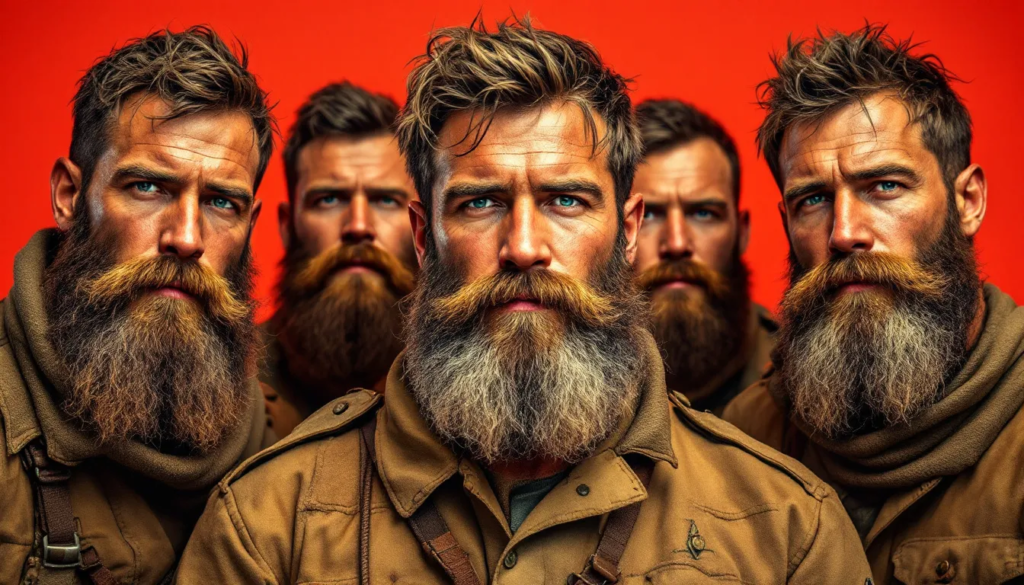
The decision to allow beards is part of a broader effort to modernize the British Army and make it more appealing to new recruits. By aligning its grooming standards with modern societal trends, the Army aims to attract a younger demographic that values self-expression and personal grooming choices. This change is expected to have a positive impact on recruitment and enhance the morale of serving soldiers.
The new policy reflects the Army’s recognition of changing societal norms and the need to adapt to remain relevant and appealing to potential recruits. The following subsections will explore how the new policy is expected to boost recruitment and enhance morale among soldiers and officers.
Boosting Recruitment
Allowing beards could make military service more appealing to individuals seeking a workplace that respects personal grooming choices. A survey indicated that a significant majority of both active and reservist soldiers supported the change, suggesting that the new policy could attract more recruits who value the freedom to grow facial hair.
Modernizing its appearance standards aims to draw in a younger demographic that may have previously been deterred by strict grooming policies. This change is part of a broader effort to ensure that the Army remains an attractive career option for new recruits.
Enhancing Morale
The freedom to grow facial hair is expected to strengthen soldiers’ sense of identity and belonging. General Sir Patrick Sanders emphasized that the new beard policy reflects the Army’s commitment to adapting to modern societal standards and enhancing the professional image of its personnel.
Facial hair, particularly beards, has historically been a symbol of valor and resilience, as seen during the Crimean War. Allowing beards acknowledges this historical significance and fosters pride and identity among soldiers. This change is expected to have a positive impact on morale and overall soldier satisfaction.
Historical Context: Facial Hair in the Armed Forces

Lifting the beard ban marks a significant shift in the British Army’s approach to personal appearance policies. Historically, beards were banned to ensure the effective fit of gas masks, which were crucial for safety during combat operations. The recent change reflects a modern shift in military grooming standards and personal expression.
Facial hair has a storied history in the British military, with regulations evolving to reflect broader societal attitudes. The historical significance of beards during the Crimean War and comparisons with the Royal Navy and Royal Air Force follow.
Crimean War and Beards
During the Crimean War, facial hair became a symbol of bravery and resilience among British soldiers. The harsh conditions of the campaign led many soldiers to grow beards as a mark of their endurance and masculine strength. The phrase ‘Crimean Heroes 1856’ reflects the significance of facial hair during this period.
King Charles’ endorsement of facial hair in the British Army acknowledges the valor and resilience symbolized by beards during the Crimean War. Allowing beards connects the Army with its historical roots while adapting to modern societal norms.
Comparisons with the Royal Navy and Royal Air Force
The British Army’s new beard policy contrasts with standards maintained by the Royal Navy and Royal Air Force. While the Army now allows beards, the Royal Navy and Royal Air Force have historically maintained different regulations regarding facial hair. This difference reflects the unique operational and cultural contexts of each armed forces branch.
The Royal Navy, for instance, has a long-standing tradition of allowing sailors to wear beards, while the Royal Air Force has typically adhered to stricter grooming standards. These variations highlight the diverse approaches to personal appearance across the different branches of the British military.
Addressing Concerns and Criticisms
The new beard policy has raised concerns and criticisms, particularly regarding operational effectiveness and uniform standards. Some military personnel fear that allowing beards could compromise the traditional image of discipline and grooming within the Army.
These concerns will be addressed in detail.
Operational Effectiveness
One of the primary concerns is that beards may hinder the effectiveness of personal protective equipment, such as gas masks. In high-risk situations, a proper seal is crucial for the safety of soldiers, and facial hair could potentially interfere with this functionality.
Despite these concerns, the Army has implemented grooming standards to ensure beards are kept neat and do not compromise the fit of protective equipment. Regular checks will ensure compliance, addressing safety concerns while allowing soldiers to express themselves through facial hair.
Maintaining Uniform Standards
A disciplined and cohesive image is essential in the armed forces. Senior non-commissioned officers have emphasized the need for strict grooming standards to ensure that the new policy does not undermine the Army’s professional appearance. Beards must be neatly trimmed and free from uneven growth to maintain uniformity.
The new regulations balance personal expression with the Army’s reputation for professionalism and smart turnout. By enforcing these grooming standards, the Army aims to uphold its disciplined image while allowing soldiers the freedom to grow beards.
Prominent Figures and Their Perspectives

Prominent figures within the British Army have expressed their views on the new beard policy, highlighting its significance and potential impact. General Sir Patrick Sanders, a key leader in the Army, has been a vocal supporter of the change, emphasizing the need for modernization and adaptability.
The following subsections will explore the perspectives of General Sanders and senior non-commissioned officers.
General Sir Patrick Sanders
General Sir Patrick Sanders, known for his progressive leadership, has embraced the new beard policy as a reflection of evolving military values. He believes that allowing beards can positively influence the overall morale and identity of soldiers, enhancing their sense of belonging within the Army.
Sanders’ proactive approach to leadership ensures that traditions evolve alongside contemporary values, making the British Army a more inclusive and modern institution. His support for the policy change underscores the importance of adaptability and the need to align military standards with societal trends.
Senior Non-Commissioned Officers
Senior non-commissioned officers have also expressed their support for the new beard policy, acknowledging its potential to enhance soldier morale and foster a sense of identity among the troops. This cultural shift allows personnel to express their individuality while maintaining the disciplined image of the Army.
These officers emphasize balancing personal expression with military discipline to ensure operational efficiency and uphold professional standards. Adapting grooming standards reflects the evolving nature of military culture and can lead to a more modern and inclusive environment for service members.
Summary
The lifting of the century-old ban on beards in the British Army represents a significant shift towards modernization and personal expression. Approved by King Charles, this change reflects a broader effort to align military standards with contemporary societal norms. The new grooming standards ensure that beards are kept neat and professional, balancing personal freedom with the disciplined image of the Army.
By allowing beards, the British Army aims to attract new recruits and enhance the morale of serving soldiers. This policy change acknowledges the historical significance of facial hair in the military and fosters a sense of identity and belonging among the troops. Despite some concerns about operational effectiveness and maintaining uniform standards, strict grooming requirements and regular checks will ensure that the Army’s professional image is upheld. This transformative change marks a new era for the British Army, embracing both tradition and modernity.
Frequently Asked Questions
Why has the British Army lifted its ban on beards?
The British Army lifted its ban on beards to modernize its standards and better align with contemporary societal norms, thereby enhancing its appeal to potential recruits.
What are the new grooming standards for beards in the British Army?
The new grooming standards for beards in the British Army require that they be well-groomed, trimmed to a length between Grade 1 (2.5mm) and Grade 8 (25.5mm), and maintained above the cheekbones and neck. Regular inspections will be conducted to ensure adherence to these standards.
How will the new beard policy impact recruitment?
The new beard policy is likely to enhance recruitment by appealing to younger candidates who prioritize personal grooming choices, thus positioning military service as a more modern and inclusive option.
What are the concerns about allowing beards in the Army?
Allowing beards in the Army raises concerns regarding their interference with the fit of gas masks and other personal protective equipment, as well as the potential impact on the Army’s disciplined and professional appearance.
What historical significance does facial hair have in the British Army?
Facial hair in the British Army historically signifies bravery and resilience, particularly noted during the Crimean War. The current policy reflects this significance while aligning with contemporary societal norms.

You might like these!


